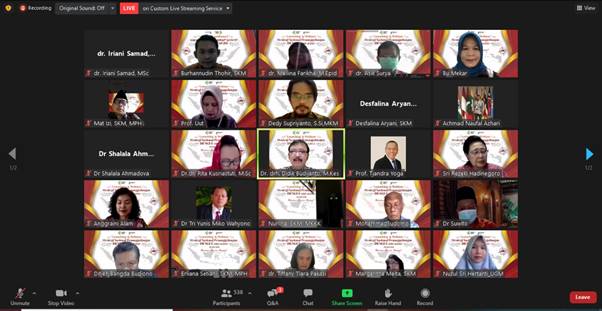
Caption: A child observes the mosquito larvae in Sekolah Alam Cokrodiningratan, 2018. Photo Credit: World Mosquito Programme Yogyakarta
On 30 July 2021, The Ministry of Health (MoH) in collaboration with WHO Country Office Indonesia launched the new National Strategic Plan (NSP) for the dengue control programme. The new NSP document is the culmination of extensive consultative process that involved relevant ministries/agencies at the national level and a diversity of partners, stakeholders, and disease experts across the country. The development of the NSP document is a follow-up action that was taken by the country to adopt the global road map 2021-2030 for neglected tropical diseases (Global NTD road map) and to reaffirm country commitment to control the burden of dengue infection by 2025.

Caption: The Director General of Diseases Prevention and Control, Ministry of Health officially launched the 2021-2025 National Strategic Plan for Dengue Control Programme in Indonesia. Photo credit: Ministry of Health
Eight thematic workshops were conducted from 22 February to 5 May 2021 to intensively discuss: stakeholder participation and roles; situation analysis; strategic issues, objectives, and targets; key strategies and approaches; programme for each strategy; implementation strategy and monitoring and evaluation (M&E); programme cost and budgeting; and financing. In addition, there were also six writing workshops that were led by the writing team for brainstorming, organizing, and writing the NSP document. The final draft of the NSP was fully endorsed by the MoH on 24 June 2021. The official launch of the road map was set for 30 July 2021 as part of the 2021 the Association of Southeast Asian Nations (ASEAN) Dengue Day commemoration.
There are two main indicators in the NSP that are related to the burden of dengue infection: the percentage of districts/cities with an incidence rate (IR) below 49/100 000 population and the case fatality rate (CFR). By 2025, the national targets are for ≥ 90% districts to achieve an IR below 49/100 000 and 0.5% CFR. These targets are in line with those in the Global NTD road map. To achieve these ambitious targets, six strategies have been prepared: (1) enhancing effective, safe, and continuous vector management; (2) improving access to and quality of dengue case management; (3) strengthening comprehensive dengue surveillance and responsive outbreak management; (4) increasing sustainable community engagement; (5) strengthening government commitment, policy and programme management, and partnership; and (6) improving assessment, invention, innovation, and research as the basis of evidence-based policy and programme management.
“As we demonstrated during the COVID-19 pandemic, working across sectors in unity and solidarity is not just a concept but a powerful force. This NSP unites us all to work together to free those afflicted by dengue infection from unnecessary suffering, stigmatization and neglect.”, said Dr Shalala Ahmadova, Medical Officer for the Communicable Diseases Programme in WHO Country Office Indonesia during her remarks in the launching event.
***


